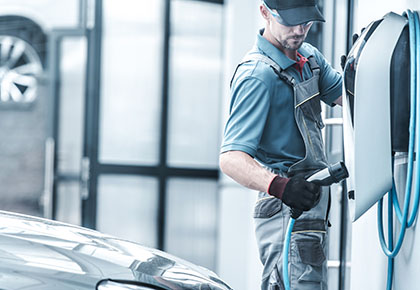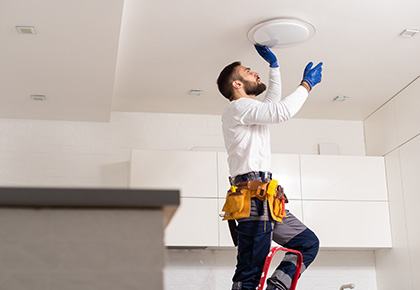-
Board Effectiveness: Is Your Board as Effective and Healthy as It Can Be?
Whether you are a board member who wants to ensure your board is doing everything it can to succeed or a resident who wants to get involved in the governing of your community, we have identified the best practices that can help you get the answers you need. -
Keeping HOA and Condo Common Areas Clean During the Coronavirus Pandemic
During these unprecedented times, residents are spending the majority of their time at home to prevent the spread of COVID-19 and protect themselves and their loved ones from infection. One of their primary contact points with the outside world is in your HOA or condo common areas, where they can be at risk of contact with lingering coronavirus or even spread existing virus to other areas of the property. Read on for a comprehensive list of places to clean and how to clean them. -
Fall tips for homeowners: Preparing your HOA for fall
Whether your HOA is self-managed or professionally managed, getting started on your fall and winter prep will help keep your operations running smoothly as the seasons and temperatures change – and that will keep your residents happy as well. -
Managing community maintenance and improvement needs
Whether your community is self-managed or professionally managed, maintenance is a big part of the day-to-day responsibilities. It’s a responsibility that can quickly become overwhelming, especially when you walk in on a Monday morning to a list of what went wrong over the weekend. -
Managing Waste for a Greener Community
With a growing focus on proper environmental stewardship, many associations are working toward implementing green initiatives. But getting there can be daunting. With so many programs and opportunities available for all of us to reduce, re-use and recycle, it’s hard to know where to begin. -
Mold: How Should Your Association and Homeowners Handle It?
No one wants to find mold in their home or any association building. Unfortunately, mold is ubiquitous – it’s in the air and in the water, and when given the chance, it spreads like crazy. Learn steps to prevent mold or to have it assessed and properly treated, preserving your buildings and the health of your residents. -
When a Natural Disaster Strikes, Is Your Association Covered?
Hurricanes. Floods. Tornadoes. Hail. Wildfires. Lightning strikes. Earthquakes. Blizzards. Mother Nature has quite the arsenal to throw at us! Unfortunately, every part of North America is subject to one or more of these events. Some, like hurricanes, come with enough advance warning to prepare for them, but most do not. That’s why it is critical to the financial health of your community association to have the proper insurance coverage in place. -
News You Can Use: Flash Flood Safety Tips to Keep Your Family Safe
In many parts of the country, flash flood watches and/or flash flood warnings are often issued during torrential downpours, especially in hurricane-prone and/or low-lying areas. -
Power Outages and Blackouts - How Your Association Can Minimize Risk
Losing power is never fun. But it’s bound to happen at some point, so preparation is the best defense. Obviously, different types of communities are affected by blackouts in different critical ways: high-rises lose their elevators and water; resort-style gated communities lose the ability to operate their gates. For residents, a blackout may be a short-term nuisance. For a community association, it can be a major headache in terms of risk management, safety and potential equipment damage that can provide an unwelcome shock to your budget. -
Why Preparation for This Hurricane Season is Important for Your Community
Is your community prepared to weather a storm? June 1st marks the beginning of the 2016 hurricane season running through November 30th. The National Weather Service reports that, of an average of 12 tropical storms that form over the Atlantic Ocean each year, six become hurricanes. In the Central Pacific, an average of three tropical storms form, with two escalating to full-blown hurricane status. Figures like these make hurricanes a very real threat for many communities and homeowners. In fact, 2016 promises to be anything but your average year. Let’s take a look at why you may want to approach this year in a way that’s as unique as the weather conditions themselves. -
Promoting Fire Safety in Your Community Association
Part of your job as a board member is ensuring the safety of residents in your community association. To that end, it’s important to educate homeowners about possible fire risks and the steps they can take to prevent fire hazards in their homes. Chances are that fire safety isn’t top of mind for residents. However, home fires are more common than most people realize. -
Pros and Cons of Do It Yourself Repairs and Maintenance
FirstService Residential's Bill Worrall discusses the hidden costs of DIY maintenance and repairs and provides great insight into how boards can determine what can be done in house and what should be subbed out to appropriate contractors. -
Put an Energy Saving Program Together for a Multifamily Property
Many HOAs and community associations would like to save energy and energy spending, but they think that putting an energy management plan into place for their multifamily property is difficult to accomplish. FS Energy's Chris Normandeau explains some basic, easy-to-do steps that can make a real impact on an association's energy usage and budget. -
5 Steps to the Best Reserve Study Specialists
In our guide to capital improvements , reserve studies and their relationship to capital improvements and preventive maintenance were discussed at length. -
Seven Ways to Fight Mold - And Win
It’s the scourge of households everywhere: the unsightly, unsanitary, unbecoming sight of mold. But waging war on mold means more than launching a full-scale assault when you see it (though that can be part of the battle plan). Instead, consider a comprehensive strategy – here are some tips to help you get started and steer clear of mold. -
Simple Energy Conservation Steps to Benefit Your Community This Winter
So what can condo boards or community associations do to mitigate or even reduce costs this winter? Let’s start with what you can do in the summer and fall, before winter actually begins. This includes cleaning, tuning and performing any necessary repairs to heating systems, furnaces and boilers to make sure they won’t be working longer, harder or less efficiently than they should. Other pre-winter tasks include cleaning gutters to remove leaves and debris to ensure water can flow freely. Otherwise, water can become trapped and freeze, which can not only damage your property’s gutters, but also cause ice dams and possible roof leaks. -
Simple Landscaping Tips To Help You Prepare for Storm Season
For most of us, storm season means prepping our residences to mitigate potential damage caused by high winds and heavy rains. But there’s a part of our homes and neighborhoods we often overlook – sometimes with disastrous results. That often-forgotten place is right outside your front door: it’s your landscaping. -
6 safety tips for summer vacation
Summer is a great time to hit the road! Travelers will be taking advantage of the warm weather to go to beaches, campsites, on cruises and more. Learn how to protect your home and preserve your peace of mind while you're away. -

Six steps to implement EV charging stations for condos
No longer the products of science fiction fantasy, electric cars are now a reality of everyday life. While the reduced emissions of personal electric vehicles, or PEVs, are good news for the environment, their charging requirements may create challenges for condo associations trying to navigate their infrastructure requirements, legal implications, management concerns and even aesthetic considerations. -
Six Things to Know About Fire Hydrants
Aside from knowing to not park next to one, how deep is your knowledge of fire hydrants? Unless you’re a firefighter, it’s probably not that extensive. This may not be a problem... until the unthinkable happens and you need to be confident that your fire hydrants are in good working order. But like any equipment in your community, fire hydrants need to be maintained. -

5 strategies for energy conservation in community associations
In this article, we delve into the significance of energy conservation within community associations, exploring its benefits and strategies for effective implementation. -
The Six Secrets to Building Your HOA Volunteer Pool
Whether you’re on the board of a single-family homeowners association (HOA) or a high-rise condo association, your community depends on volunteers to operate successfully. However, finding residents who are willing to be on your board of directors, join a committee or help at an event can be challenging. -
3 common residential drainage problems and their solutions
Unless you live in an area where it hardly ever rains (in which case you have a whole other set of problems), drainage will be an issue in your community. Proper drainage is, of course, the answer, but getting there means you have to meet stringent requirements throughout different areas of your community. -
Tips for Eco-Friendly High-Rise Living: Living Sustainably in the City
Many multifamily properties and high-rises want to implement “green” living practices and create eco-friendly communities, but not everyone knows where nor how to get started. Here are some effective and easy tips to help you be proactive and successful in achieving your sustainability goals. Read on for a list of programs and services that can be put in place in your community at little to no cost.